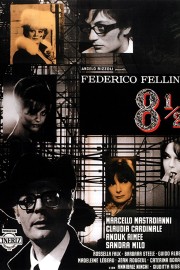8 1/2
I first saw Fellini’s “8 1/2” in 1998 I believe. It’s no small understatement that I didn’t really understand what I saw at that time, although I did know this much- it was a great film.
I’ve seen it a few times more since then, have read essays about it, and yet watching it again after seeing the movie adaptation of the musical “Nine” (which was inspired by Fellini’s film), I still found myself endlessly surprised by the film. Some films are like that- they are the ones that need be cherished most in a way.
Early on, a fundamental difference between Fellini’s film and “Nine” became clear- Fellini’s work is over-abundant with joy to go with the agony Guido (the irreplaceable Marcello Mastroianni) feels as he tries to focus his thoughts on his eighth and a half film, whereas “Nine” shows us the agony of Guido’s struggle, and struggles to find the joy of Fellini’s work.
For Fellini, Guido’s journey is as much a spiritual one than a creative one. Like the main character of Fellini’s equally-great 1960 film “La Dolce Vita,” Guido’s artistic compass is off-balance because of the spiritually-corrupting forces of the outside world. But Guido is not completely blocked of artistic ideas- he just cannot express them clearly. Meanwhile, his producers, his collaborators, his star, are all clamoring for information, for a guiding light that Guido is unable to provide.
We hear snippets of ideas about Guido’s film, we see a giant spaceship set they’ve constructed for it. The disparity between the two is obvious as we watch. But that’s the point, really. Guido does not know about the film he wants to make anymore.
Fellini doesn’t have that problem. While the film moves sometimes abruptly between time and place, between Guido’s time at the spa where he’s trying to get himself healthy and between flashbacks of his early life and the dreams of his guilty conscience, Fellini’s instincts as a storyteller are always clear. He sympathizes with Guido’s plight, but doesn’t let him out of it with easy solutions, because he understands…because in a very real way, Guido’s plight was his own (I’ll let critics wiser than myself, such as Roger Ebert, discuss that though).
It’s that sense of the autobiographical that elevates Fellini’s film to the highest reaches of the artform. This past decade, Charlie Kaufman has made two films in the vein of “8 1/2”- the first his 2002 collaboration with Spike Jonze “Adaptation.,” the second being his 2008 directorial debut “Synecdoche New York”- but as superb as those are, he can’t match the sometimes-profane, but always very sacred delights within Fellini’s film, with its’ unforgettable imagery (most especially Guido quelling a rebellion of the women in his harem), the Nino Rota score (and the snatches of classical music that accompany certain scenes), and above all, the charm and sadness of Mastroianni’s Guido. He struggles so much for clarity in his art and in his life, only to lose it…sometimes when it’s just within reach. Still, it’s that struggle that has inspired so many filmmakers over the years, and even if Guido can’t overcome it in the end, the greatest inspiration is that Fellini was able to, and produced a masterpiece.











Thank you for this post.
Anniversary of 8 1/2 coming soon. I really liked this analysis on 8 1/2 and Fellini 🙂
https://www.youtube.com/watch?v=0WJwnkKuQZ4
theo.valen301@gmail.com